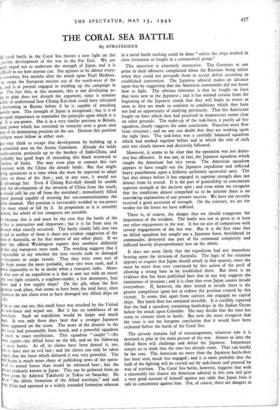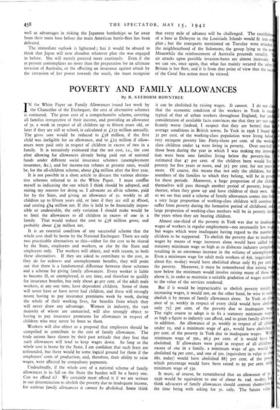THE CORAL SEA BATTLE
By STRATEG ICUS flE naval battle in the Coral Sea throws a new light on the possible development of the war in the Far East. We are pently urged not to underrate the strength of Japan, and it is fdifficult to see how anyone can. She appears to be almost every-
re five months after the attack upon Pearl Harbour. has swept the European nations out of the south-west of the and is at present engaged in winding up the .campaign in pa. The fact that, at this moment, this is not developing ac- ting to plan does not disturb the argument, since it remains osible to understand how Chiang Kai-shek could have refrained p intervening in Burma before if he is capable of attacking sfully now. The strength of Japan is recognised ; but it is of t equal importance to remember the principle upon which it is It is sea-power. She is in a very similar position to Britain, and power which has stretched its tentacles over a great area
• rue of its dominating position on the sea. Destroy this position collapse must follow in either case.
an may think to escape that development by building up a connected area on the Asiatic Continent. Already she holds south-eastern peninsula up to the borders of Indo-China, and probably has good hope of extending this block westward to borders of India. She may even plan to connect this vast territory with the China she already holds. But that might 1 big operations at a time when she must be expected to adapt plans to those of the Axis ; and, in any case, it would not
• advantage her. Even if Chiang Kai-shek should be unable eck the development of the invasion of China from the south, would still be cut off from the mainland ; immediately Allied wer proved capable of severing her sea-communications she be doomed. Her position is irrevocably wedded to sea-power she must stand or fall by it. In proportion as it is unstably lished, the whole of her conquests are unstable.
.is because this is and must be the case that the battle of the Sea is instructive and important ; but it is far from easy to tand what exactly occurred. The battle clearly falls into two and in neither of them is there any evident suggestion of the sion of Australia, or for that matter of any other place. If we e the official Washington reports they nowhere definitely that any transports were sunk. The wording suggests that it Impossible to say whether the four vessels sunk or damaged transports or cargo vessels. That they were some sort of l}• ships seems the more probable, since two were sunk, and it ost impossible to be in doubt when a transport sinks. More- , what sort of an expedition is it that is sent out with an escort only two light cruisers, a seaplane-tender, a few destroyers, four boats and a few supply ships? On the 4th, when the first ment took place, that seems to have been the total force, since Japanese do not claim even to have damaged any Allied ships on day.
iS far as one can see, this small force was attacked by the United Os task-force and wiped out. But it has no semblance of an Iron-fleet. Such an expedition would be larger and much lger. It was only three days later that a stronger Japanese Inchon appeared on the scene. The news of the disaster to the *.er force had presumably been heard, and a powerful squadron at south to exact retribution. This squadron " caught "—the !mese report—the Allied force on the 6th, and on the following f It gave battle. As all its claims have been denied it, too, Pars to have met an evil fate ; and the claims can only be taken 1.tiggest that the force which defeated it was very powerful. The Ilted States is much more chary of publishing news of the opera- ka. of its armed forces than would be tolerated here ; but the is are evidently known in Japan. This can be gathered from an given by Admiral Takahashi in Tokyo on Saturday. He Ike of " the idiotic formation of the Allied warships," and said lithe Allies had operated in a widely extended formation whereas
in a naval battle nothing could be done " unless the ships worked in close formation or fought in a symmetrical group."
This interview is extremely instructive. The Germans at one point in their offensive complained about the Russians being unfair when they could not persuade them to accept defeat according to established convention. The Japanese admiral makes an advance upon that by suggesting that the American commander did not know how to fight. The obvious inference is that he fought on lines that were new to the Japanese ; and it has seemed certain from the beginning of the Japanese attack that they will begin to waver as soon as they are made to conform to conditions which they have not had an opportunity of studying previously. That the Americans fought on lines which they had practised in manoeuvres seems clear on other grounds. The make-up of the task-force, a purely ad hoc squadron, clearly suggests the same conclusion. Function must flow from structure ; and no one can doubt that they are working upon the right lines. The task-force was a carefully balanced squadron which had worked together before and in which the role of each unit was clearly known and decisively followed.
Moreover, it seems to be clear that the operation was not defen- sive but offensive. It was not, in fact, the Japanese squadron which caught the American but vice versa. The American squadron appears to have sought out the Japanese expedition and inflicted heavy punishment upon a hitherto uniformly successful navy. The fact that always before it has engaged in superior strength does not detract from its record. It is the part of generalship to concentrate superior strength at the decisive spot ; and even when we recognise that the conditions almost compelled us to be inferior there is no convincing explanation of our present success. We have not recently received a great accession of strength. On the contrary, we are the weaker for the losses we have suffered.
There is, of course, the danger that we should exaggerate the importance of the incident. The battle was not as great as at least one other engagement in the war. It has no sort of comparison with several engagements of the last war. But it is the first time that an Allied squadron has sought out a Japanese force, bewildered its commander, destroyed one part of his command completely and inflicted heavily disproportionate loss on the whole.
It does not seem likely that the expedition had any immediate bearing upon the invasion of Australia. The logic of the situation appears to require that Japan should attack in that quarter, since she must be more than ever convinced by this action of the peril of allowing a strong base to be established there. But there is no evidence that has been published here that in any way suggests the imminence of invasion ; and it is clear that even Japan cannot invade everywhere. If, however, she does intend to invade there is the greater compulsion upon her to redress the position created by this victory. It seems that apart from carriers she engaged no capital ships. Her battle fleet has remained invisible. It is credibly reported that she had a squadron containing battleships in the Indian Ocean before the attack upon Colombo. She may decide that the time has come to venture them in battle. But now she must recognise that the issue is not the foregone conclusion that it would have been reckoned before the battle of the Coral Sea.
The episode remains full of encouragement, whatever role it is destined.to play in the main picture of the war. Sooner or later the Allied fleets will challenge and defeat the Japanese. Impatience tempts us to think that the time has already come. That can hardly be the case. The American no more than the Japanese battle-fleet has been seen, much less engaged ; and it is more probable that the bulk of the fighting will be carried out by task-forces and proceed by way of attrition. The Coral Sea battle, however, suggests that with a reasonably fair chance the American admiral in this area will give a very good account of himself against any odds that Japan feels it safe to concentrate against him. For, of course, there are dangers as well as advantages in risking the Japanese battleships so far away from their main base before the main American battle-fleet has been defeated.
The immediate outlook is lightened ; but it would be absurd to think that Japan will now abandon whatever plan she was engaged in before. She will merely proceed more cautiously. Even if she at present contemplates no more than the preparation for an ultimate invasion of Australia, or the effecting an insurance against attack by the extension of her power towards the south, she must recognise that every mile of advance will be challenged. The establish of a base at Deboyne in the Louisiade Islands would fit into ei plan ; but the transports mentioned on Tuesday were attacked the neighbourhood of the Solomons, the group lying to the no Meanwhile the reinforcement of Australia proceeds steadily. air attacks upon possible invasion-bases are almost incessant. we can see, once again, that what has mainly secured the safer Britain is her fleet, and it is from that point of view that the suc of the Coral Sea action must be viewed.



























 Previous page
Previous page